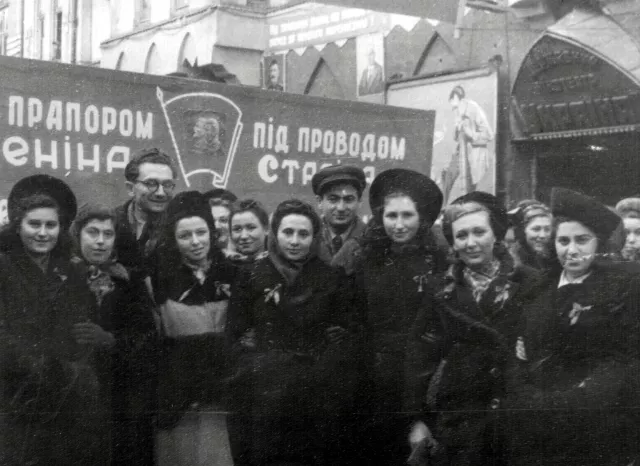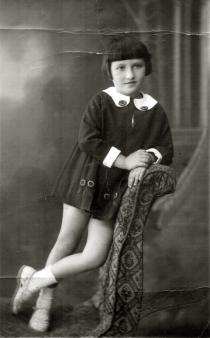This is me, third from right, and my group at the parade on October Revolution Day, we were second year students. This photo was taken in Chernovtsy in 1947. There is a slogan behind us. It says 'Under the banner of Lenin, under the leadership of Stalin' in Ukrainian. On the left is the entrance to the cinema theater ?Ukraina?.
In 1946 I finished the tenth grade and wanted to study languages. I entered the French department of the Philological Faculty of Chernovtsy University. My parents and I moved to Chernovtsy. At the end of the war many Ukrainian families left the town following the retreating Germans and there were vacant apartments available. After the liberation of Transnistria, Jews from the ghetto rushed to Chernovtsy: we were a little late having stayed in Kishinev for a year. Those who came there in 1945 lived in nice apartments. Chernovtsy is a beautiful town. Our faculty resided in the former Metropolitan's residence, in the beautiful building of red bricks.
I lived the best years of my life when I was a student. We were divided into two groups. I was in a stronger group where all students were Jews and only two Ukrainians. Almost all students in our group were either veterans of the war or former inmates of ghettos in Transnistria. The political situation was rather severe: there were Bandera gangs in the area. One day we went to the university and got to know that all third-year students had been arrested. The authorities had found out that they had Bandera flyers. At this time the campaign against 'cosmopolitans' began. Ilia Gordon, a Jewish lecturer on foreign literature was sent away from Kiev to work in our town. The Party Bureau taped his lectures to review them later. We felt sorry for him and did our best to study his subject and obtain good marks in it.
Another demonstration of state anti-Semitism was that they closed the Jewish Theater in Chernovtsy. Actually, this was the Kiev Theater, but after the war they weren't allowed to return to the capital and had to move to Chernovtsy. They were always sold out since Chernovtsy was a Jewish town then. Some actors went to work in Russian and Ukrainian theaters, but many lost their jobs after it had been closed down. I also remember another incident: the university announced a party for local young people. I thought since I was a Bessarabian girl I was to be a local resident, but they didn't let me in, or any Jew for that matter. Only Ukrainians were allowed to attend it. However, there wasn't much impact of this kind on our studies. Our group was very close. We often had parties, celebrated birthdays, went to the theater and cinema. Our groups welcomed the establishment of Israel. We were ready to move to Israel as volunteers. Our co-student Anatoliy Kogan, who later became a writer in Kishinev, could play the piano very well. He occasionally played the 'Hatikva': there was a piano in the corridor of our faculty. Of course, we were a little afraid, but we were young and we were happy about Israel. Later, twelve former students of our group moved to Israel. Four still live there.
Sarra Shpitalnik with her collegues at the parade on October Revolution Day
The Centropa Collection at USHMM
The Centropa archive has been acquired by the United States Holocaust Memorial Museum in Washington, DC.
USHMM will soon offer a Special Collections page for Centropa.
Academics please note: USHMM can provide you with original language word-for-word transcripts and high resolution photographs. All publications should be credited: "From the Centropa Collection at the United States Memorial Museum in Washington, DC". Please contact collection [at] centropa.org.




















